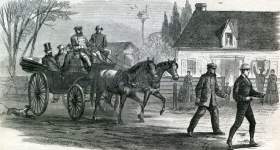At noon in the city center of Portland, Maine, twenty-eight year old Edward Payson Weston set out for Chicago on foot. He had engaged in a wager for $10,000 with gambler T.F. Wilcox that he could walk from Portland to Chicago in thirty consecutive days, excluding Sundays. On this day, he had reached Plainfield, Connecticut. The event was extensively followed in the regional and national press, and when Weston reached Chicago city limits just after nine in the morning of November 28, 1867, one day earlier than the deadline, he was welcomed by 50,000 people and was already a household name. The feat was crucial to the rise of the remarkable popularity in the following decades of what was called "pedestrianism." (By John Osborne)
Matthew Algeo, Pedestrianism: When Watching People Walk Was America's Favorite Spectator Sport (Chicago, IL: Chicago Review Press, Inc., 2014), 12-14.
"The Pedestrian Feat," Harper's Weekly Magazine, November 16, 1867, p. 725.




